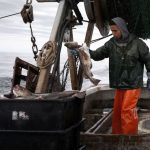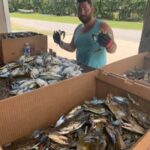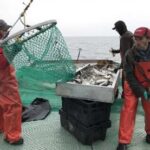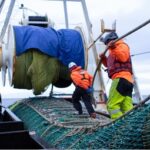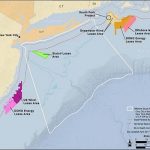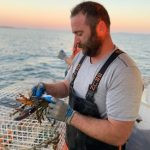Tag Archives: Maine lobstermen

Whale info way off, by Maine Lobsterman Leonard Young
Reading Bill McWeeny’s July 23 commentary bothered me a great deal. His statement that right whales have never been so close to extinction since they were hunted is untrue. I’ve been a lobsterman for almost 50 years, and we’ve been dealing with the whale issue for almost two decades. When we started this process, we were told there were 200 of these animals. Mr. McWeeny decided to omit the fact that we had modified our gear many years ago with sinking ground lines, breakaways in our end lines and more traps on end lines to decrease end lines. Since we did this, entanglements decreased considerably. These animals had increased to almost 500. Then they changed their feeding ground,, by Maine Lobsterman Leonard Young, Corea >click to read< 11:20
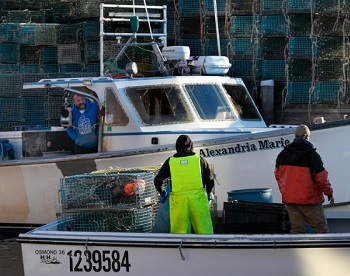
It’s time to open the economy back up! Maine Lobstermen Seek Ways To Prevent Financial Crash
Anti-glut tactics might include limiting days at sea, narrowing size limits or barring the catch of single-clawed lobsters to reduce the overall haul. In an online meeting Monday, Marine Resources Commissioner Patrick Keliher told Downeast lobstermen that he’s found no consensus on the best course of action. Lobsterman Jim Hanscom, of Bar Harbor, says he is wary of intervention by Gov. Janet Mills. “This governor scares me on a lot of levels, and the idea of her having the ability on shutting this fishery down or stopping dealers from buying, I think it’s just dangerous.” Keliher is scheduled to brief Mills on the issue Tuesday,,, >click to read< 10:40
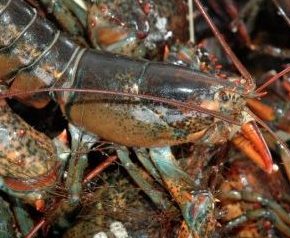
State of Maine: Lobstermen are feeling the pinch
Maine lobstermen are in a world of hurt, caught in a two-pronged assault on their livelihood. The pincer claw is the pandemic, causing their market to collapse. The crusher claw? That would be the latest lawsuit over whale rules.,, Even the elders in the fishing community are rattled. They are usually the ones who face fluctuations in the market with zen-like calm. It’s been down before, they say, and it will come back. Every year is not going to be a record-breaker. This time they’re worried. Younger fishermen who have gotten accustomed to record catches every year have taken on significant debt (bigger boats, newer trucks) and are freaking out. Jill Goldthwait >click to read< 11:09
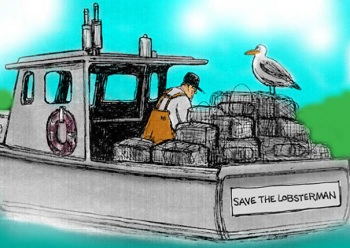
Maine lobstermen are not a threat to right whales
The voices of Maine’s lobster fishermen are being drowned in a sea of injustice. I’m determined to speak for them. U.S. District Court Judge James Boasburg’s recent ruling is the latest blow to Maine’s billion-dollar industry. Boasburg’s decision that the National Oceanic and Atmospheric Administration violated the Endangered Species Act by authorizing the American lobster fishery despite its potential to harm the North Atlantic right whale population comes on the heels of new regulations imposed on fishermen last year. With many fishermen just starting to mark their fishing gear according to the new regulations, Boasburg’s ruling has left them in a state of uncertainty. Will this be the end of the industry as they know it? by Carol Smith, >click to read< 09:15
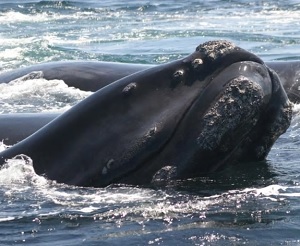
Maine lobstermen tell federal regulators: We’re not killing the whales
The Maine Lobstering Union accuses the agency of caving to environmental organizations when it should be defending the industry. Kristan Porter, a Cutler lobsterman who heads up the Maine Lobstermen’s Association, said the modeling tool the agency had come up with to determine risk had been sharply criticized by a team of independent scientists during a peer review conducted late last year. Stonington lobsterman Julie Eaton urged regulators to stop playing dangerous games with fishermen’s lives and livelihoods. We don’t want to see any animal go extinct, but blaming us for the right whale’s decline is like blaming Mexico for the plight of the polar bear, she said. >click to read< 09:47

Video: Maine lobstermen look to Asian Carp as potential solution for bait crisis
“My bait bill today was ridiculously high, I think. But there’s people that spend more,” said Lobsterman Steve Train. The rising costs are credited to increased demand, but also new regulations that limit the catch for one of the most popular fish for lobstering – herring. “The reality is it’s not the just the price, it’s the availability. Without the herring coming on to put in the bait bags to catch lobsters… we’re going to have a bait shortage,” said Train. The state estimates a nearly a 50,000,000 pound herring gap in the next year. >Video, click to read< 11:19
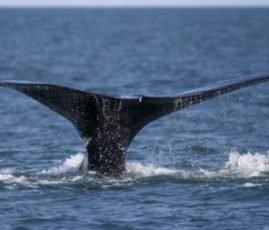
Scientists review divisive whale risk reduction model
A panel of scientists gathered in Woods Hole, Mass., last week to evaluate a controversial “decision support tool” used by NOAA’s National Marine Fisheries Service to design proposed rules aimed at protecting endangered North Atlantic right whales and other large marine mammals from entanglement with fishing gear. Last spring, the NOAA Fisheries Atlantic Large Whale Take Reduction Team (TRT) recommended that the fisheries service adopt new rules that would, among other requirements, force Maine lobstermen to remove from the water 50 percent of the vertical lines used to connect traps on the bottom to marker buoys on the surface. >click to read< 11:07
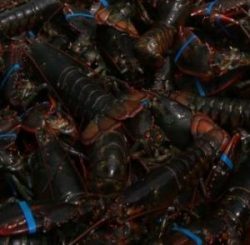
Meetings this week – Lobster industry braces for right whale changes amid turbulent times
“Right now, we’re all fishing hard, so it’s taking our mind off it some, but it feels like we’ve been waiting and worrying about what whales might do to us for so long now,” said Jake Thompson, a Vinalhaven lobsterman. “We can manage the rest of it, but whales? Everybody’s worried about whales.” Lobstermen will have a chance to weigh in on Maine’s plan to protect the endangered right whale from buoy line entanglements at Maine Department of Marine Resources meetings in Ellsworth, Waldoboro and South Portland this week. >click to read< 06:51

DMR’s answer to whale rules focus offshore
Last week, DMR Commissioner Patrick Keliher announced that after “rigorous scientific analysis,” the department had come up with a new draft plan to address “both the risk to right whales and concerns of fishermen” that is “in keeping with the real risk the Maine fishery presents.” Last March, the National Marine Fisheries Service announced that the risk of injuries to right whales in the Gulf of Maine had to be reduced by at least 60 percent. Last March, the National Marine Fisheries Service announced that the risk of injuries to right whales in the Gulf of Maine had to be reduced by at least 60 percent.,,, The rule also would extend electronic vessel monitoring now required on boats that hold permits to fish for species other than lobster in federal waters to all federally permitted lobster boats. >click to read< 11:27
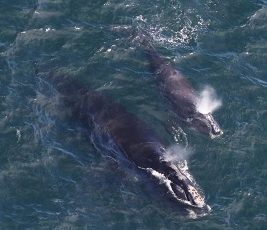
Maine’s lobstermen willing to work with feds to protect whales
The Maine Lobstermen’s Association is one of the key stakeholders in an effort to better protect the North Atlantic right whales,,, A federal plan that’s being developed to help save the whales would remove miles of lobster trap rope from the waters off Maine.,, regulators have also recently expressed desire to work with the lobstermen, who have said the whale protection plan placed too much onus on their business, which is an industry vital to Maine’s economy. Chris Oliver, NOAA’s assistant administrator for fisheries, said this month that federal managers are also “diligently working with our Canadian counterparts to address both ship strikes and entanglements in Canadian waters.” >click to read< 14:18
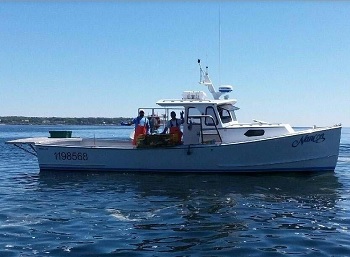
If you think lobster prices don’t affect you, think again
A recent social media post made by a local marketing firm sharing a photo of a shirt being sold in town that says “Make Lobster $1.97 lb. Again” stirred some controversy. Although it was intended to be a “joke,” it was no joking matter for many of us in the lobster industry. We remember all too well in the early 1990′s when lobsters were indeed this cheap, and how we were hurting. No one in dairy country would joke about milk being $1 a gallon, as most people are well aware of the struggles farmers face,,, Farmers feed our country – and so do American commercial fishermen.,, Right now, more than ever, Maine lobstermen need the public’s support. Maine lobster is well worth every penny paid for it. by Shelley Wigglesworth >click to read< 16:29

Maine fishing practices at center of debate about endangered right whale
Hutchings thinks the looming regulations to save the right whale, an endangered species, are only part of the problem with the industry. National Oceanic and Atmospheric Administration is proposing the new rules. He would like to continue fishing lobster for a few more years to be able to say he spent 50 years as a fisherman, but said he feels more financial constraints every year. “I’d hate to be a young guy starting out,” Hutchings said. “ … It (NOAA) should be more worried about the fishermen becoming extinct.” >click to read< 11:49
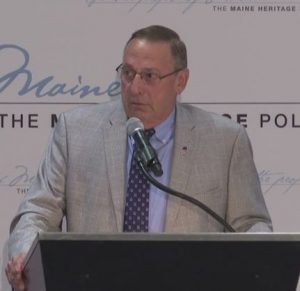
LePage talks to White House about controversy over lobstermen restrictions
Former Gov. Paul LePage continues to be involved with the debate over proposed new regulations on Maine lobstermen, designed to protect right whales. Several weeks ago, Gov. LePage sent a letter to President Donald Trump, opposing those new restrictions and saying they are an “overreach” by the government because Maine fishermen aren’t harming the whales. Now the former governor’s political organization says LePage had a phone conversation on the issue today with what it calls “senior White House officials.” >click to read< 18:27
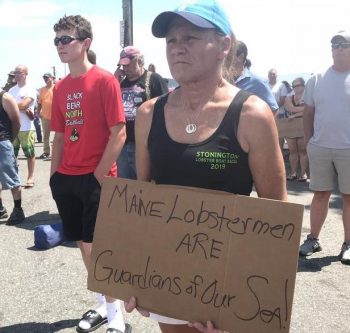
Hundreds Of Maine Lobstermen Protest Federal Regulations At Stonington Unity Rally
Hundreds of lobstermen and their allies turned out for a unity rally in Stonington Sunday. They were protesting a federal proposal to cut by half the rope they use to haul their traps – a measure to protect the endangered North Atlantic right whale from potentially deadly entanglements. Winter Harbor lobsterman Philip Torrey says the industry has adapted to numerous federally mandated gear changes over the years, and he says the latest proposal could force him to connect more traps to each of his lines, adding cost and danger to his work. >click to read< 11:49
Lobstermen and women rally against industry regulations, right whale deaths – Photo’s and a report, >click to read< 12:20
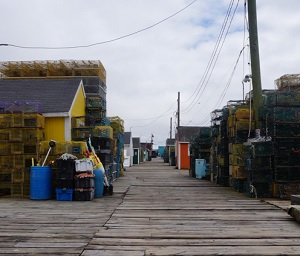
Further city waterfront restrictions won’t benefit fishermen
People who fish for a living need new berthing, enhanced branding, higher catch prices and a vibrant local economy. Having fished commercially for over 30 years, co-founded the Northwest Atlantic Marine Alliance to help fishermen and served as a board member of the Portland Fish Exchange, I constantly champion the working waterfront. So I fear the mistake Portland’s about to make, surrendering to slick videos from lawyers and lobbyists and approving damaging zoning on the waterfront. >click to read< by Craig A. Pendleton18:51
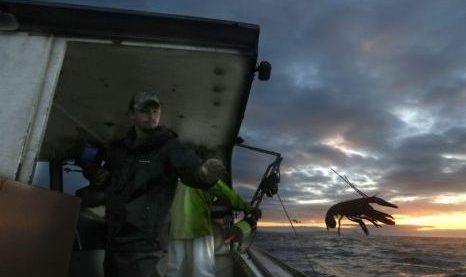
Maine Lobstermen Face 50 percent Trap-Rope Reduction To Protect Right Whales
Representatives from 14 Atlantic coast states participated in the four-day consensus-building project, including fishermen scientists, state regulators and conservation groups. The stakes were highest for Maine’s lobster industry, which landed $484 million worth of the crustaceans last year – the most valuable single-species fishery in the nation. The Cape Cod Times reports that Massachusetts and New Hampshire agreed to a 30% cut in the number of vertical lines, and to use ropes that break at a reduced weight. “The regulations proposed here today are a big ask,” says Patrick Keliher, the commissioner of Maine’s Department of Marine Resources. >click to read<13:06
NOAA – Team Reaches Nearly Unanimous Consensus on Right Whale Survival Measures ->click to read<15:50

Jared Golden asks feds to delay fishing restrictions that aim to protect whales
U.S. Rep Jared Golden, a Democrat who represents Maine’s 2nd District, on Tuesday asked federal officials to reconsider regulations meant to protect North Atlantic right whales. Maine lobstermen say the proposed changes would significantly harm their livelihoods. Golden said in a release that he is “deeply troubled” by the manner the Atlantic Large Whale Take Reduction Team (TRT) plans to reduce right whale mortality by 60 percent to 80 percent, and by “the impact its actions may have on the future viability of our lobster fleet.” >click to read<22:50
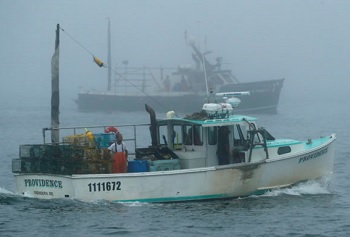
Despite a banner year, looming bait crisis leaves plenty of Maine lobstermen anxious
Patrice McCarron, executive director of the Maine Lobstermen’s Association, is worried about the severity of herring restrictions imposed by the federal government after the species failed to reproduce in sustainable numbers last year. “It’s about as bad as we can imagine, but we don’t yet know what it’s going to translate to for the fishermen,” McCarron said. McCarron said that Maine fishermen face a shortage of some 50 million pounds of bait in the coming season. “We’re seeing an 84 percent reduction in that particular source of bait, so we’ll have less than 5,000 metric tons, which will probably be caught in a week, in one week,” she said.>click to read<12:04
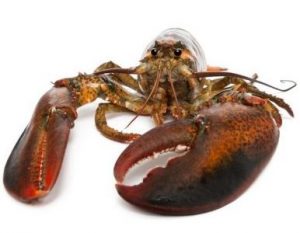
Congrats to Maine’s Lobstermen Who Smashed Previous Year’s Catch By 8 Million Pounds
Maine lobstermen brought more than 119 million pounds (54 million kilograms) of the state’s signature seafood ashore last year, an increase that helped to propel the total value of Maine’s seafood to the second-highest value on record, state officials said. The value of the 2018 lobster catch was more than $484 million, and the total value for all Maine seafood was more than $637 million, according to the Maine Department of Marine Resources. >click to read<11:13
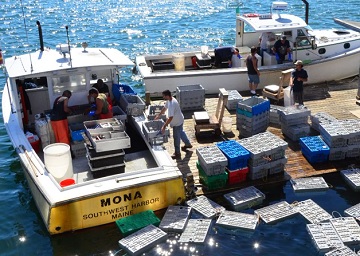
Whales and license laws top lobster industry agenda
The blowy weather that made lobster fishing a hard chance recently might well have been a blessing in disguise. The wind and cold certainly have given shorebound Maine lobstermen a good chance to learn about the tempests engulfing their industry in the Legislature and the world of fisheries regulation. Already beset by limits on how they fish — trap numbers, trawl length, the kind and strength of rope used for groundlines and buoy end lines are all regulated in the name of conservation or protecting endangered northern right whales — lobstermen are waiting to see what new rules regulators may impose on the fishery. >click to read<11:45
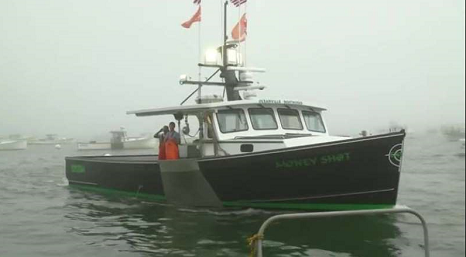
Ocean Shock: Lobster’s great migration sets up boom and bust
A lobster tattoo covers Drew Eaton’s left forearm, its pincers snapping at dock lines connecting it to the American flag on his upper arm. The tattoo is about three-quarters done, but the 27-year-old is too busy with his new boat to finish it.,,, Eaton belongs to a new generation of Maine lobstermen who are riding high, for now, on a sweet spot of climate change. Two generations ago, the entire New England coast had a thriving lobster industry. Today, lobster catches have collapsed in southern New England, and the only state with a significant harvest is north in Maine, where the seafood practically synonymous with the state has exploded. >click to read<11:54

NOAA scientists admit a gaffe on risk to whales of lobster trap lines
Late last month, the NOAA Fisheries Northeast Fisheries Science Center released a “technical memorandum” suggesting that expensive efforts by Maine lobstermen aimed at reducing the risk that endangered North Atlantic right whales and other large whales would become entangled in vertical buoy lines had backfired. According to the memorandum, issued just before a weeklong meeting of NOAA’s Atlantic Large Whale Take Reduction Team in Providence, R.I., to consider possible changes to the Atlantic Large Whale Take Reduction Plan, when the industry increased the number of traps trawled together and marked by a single buoy line, lobstermen began using stronger rope. That worsened the entanglement problem. >click to read <13:01
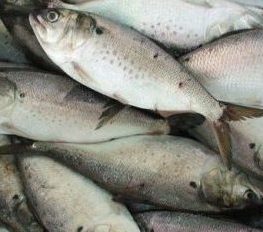
Large pogy catch good news for Maine lobstermen who feared bait shortage
All of the landings have yet to be counted, but officials say it is likely that an unusually large pogy fleet will have caught almost 7 million pounds of the fish, which is more than double last year’s landings. This comes as especially good news for Maine lobstermen, who use pogies to bait their traps when the herring supply runs low, as it is expected to this year. “Every pogy used was herring not used,” said Kristan Porter, a Cutler lobsterman and president of the Maine Lobstermen’s Association, which has been working with its members to prepare them for the herring shortage. >click to read<07:09
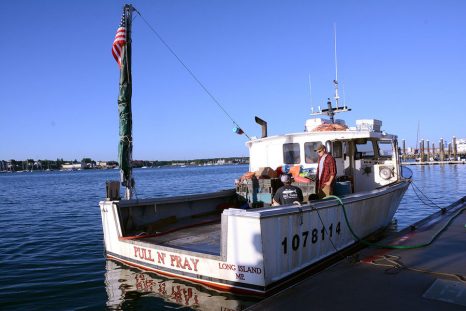
For Maine lobstermen, conservation and success go hand in hand
It’s 7 a.m. on the Pull n’ Pray. The lobster boat rocks over large swells as the water sparkles in the June morning sun. The grating whirr of the hydraulic winch drowns out the hum of the boat’s motor as it lifts the first lobster trap of the day out of the water. Justin Papkee swings the trap up onto the side of his boat and quickly opens the latch. Suddenly there are lobsters flying through the air. Mr. Papkee’s blue rubber gloved hand is nearly a blur as he reaches again and again into the open trap, tossing the lobsters back into the water rapid-fire before pulling in the next trap. >click to read<12:28

Maine lobstermen’s conservation efforts an investment in the future
How many of you keep money in the bank? Savings accounts, money market accounts, certificates of deposit or investments — we all use different methods to ensure that we have something set aside for the future. Maine lobstermen have been doing just that for the past century, making sure that there will be lobsters in the Gulf of Maine for their children and grandchildren to harvest. In doing so, they have earned a worldwide reputation as leaders in stewardship of marine resources. >click to read< 10:19 
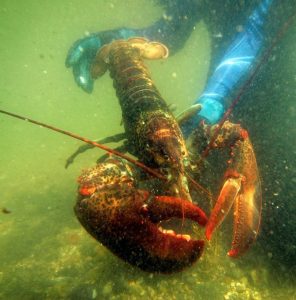
Gulf of Maine lobster boom over as population starts to decline
The Gulf of Maine lobster population will shrink 40 to 62 percent over the next 30 years because of rising ocean temperatures, according to a new study released Monday. As the water temperature rises – the northwest Atlantic ocean is warming at three times the global average rate – the number of lobster eggs that survive their first year of life will decrease, and the number of small-bodied lobster predators that eat those that remain will increase. Those effects will cause the lobster population to fall through 2050, according to a study by scientists at the Gulf of Maine Research Institute, University of Maine and National Ocean and Atmospheric Administration. >click here to read< 19:49 
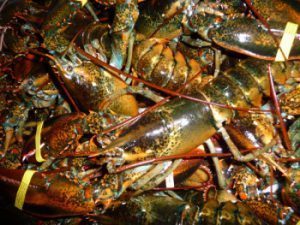
Lobstermen alarmed at prospect of sharing their secrets with regulators
For generations, Maine lobstermen have fiercely guarded their fishing secrets, telling almost no one how and where they fish or how much they haul up in their traps. But under a new proposal, these independent operators would have to share all the nitty-gritty details with regulators, like where they fish, how long they let their traps soak, the kind of gear they use and how deep they set it, and how much lobster they land. click here to read the story 08:35
First half of Maine’s lobstering season ‘painfully slow’ for fishermen
 A cold spring, high bait prices and a stormy summer are adding up to a slow lobstering season in Maine. Every fisherman and every lobstering port along Maine’s 3,500-mile coastline is different. But as of Oct. 1, the midpoint in the industry’s peak season, most Maine lobstermen and the dealers who buy from them agree the catch is down. They disagree on whether the industry will be able to land enough lobster to recover and keep up with the last few years of record harvests. click here to read the story 07:46
A cold spring, high bait prices and a stormy summer are adding up to a slow lobstering season in Maine. Every fisherman and every lobstering port along Maine’s 3,500-mile coastline is different. But as of Oct. 1, the midpoint in the industry’s peak season, most Maine lobstermen and the dealers who buy from them agree the catch is down. They disagree on whether the industry will be able to land enough lobster to recover and keep up with the last few years of record harvests. click here to read the story 07:46

Maine lobstermen serve booming world market
From trade deals in Europe and China, to the price per pound customers pay at the dock for their nightly dinner, York is a microcosm for both the uber international and the uber local sides of the lobster industry. And local lobstermen serving both markets are just pleased to see the lobsters here are finally shedding their shells and are getting hungry, filling traps that up until now have been pretty light due to colder than usual ocean temperatures during June and early July.,,, Jeff White, president of the York Lobstermen’s Association, said this season is “more like 20 years ago. You never expected to get anything until the middle of July. Why is it different? I really don’t know. The lobsters know and they’re not telling. click here to read the story 09:10
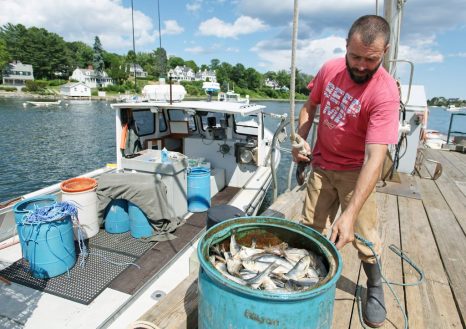
This year, a welcome switch on bait supply for Maine lobstermen
Bait freezers along the coast are full of herring and pogies, and even alewives, which means that bait is not only available, it is also much less expensive than last year when herring cost as much as 60 cents a pound, said Pat Keliher, commissioner of the state Department of Marine Resources. This year the lobstermen’s go-to bait costs about half as much. That’s still not a great price, Keliher said. Herring fetched about 18 cents a pound at the start of the 2015 lobstering season. “I won’t say we’re in great shape, but we are in a heck of a lot better shape than we were last year,” Keliher said. He attributed the strong start to basic supply-and-demand economics. click here to read the story 08:18

































